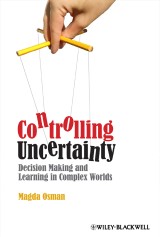Details

Controlling Uncertainty
Decision Making and Learning in Complex Worlds1. Aufl.
|
97,99 € |
|
| Verlag: | Wiley-Blackwell |
| Format: | EPUB |
| Veröffentl.: | 18.07.2011 |
| ISBN/EAN: | 9781444351804 |
| Sprache: | englisch |
| Anzahl Seiten: | 360 |
DRM-geschütztes eBook, Sie benötigen z.B. Adobe Digital Editions und eine Adobe ID zum Lesen.
Beschreibungen
<i>Controlling Uncertainty: Decision Making and Learning in Complex Worlds</i> reviews and discusses the most current research relating to the ways we can control the uncertain world around us. <ul> <li>Features reviews and discussions of the most current research in a number of fields relevant to controlling uncertainty, such as psychology, neuroscience, computer science and engineering</li> <li>Presents a new framework that is designed to integrate a variety of disparate fields of research</li> <li>Represents the first book of its kind to provide a general overview of work related to understanding control</li> </ul>
Preface: The Master Puppeteer. <p>Acknowledgements.</p> <p>1. Introduction.</p> <p>2. Causation and Agency.</p> <p>3. Control Systems Engineering.</p> <p>4. Cybernetics, Artificial Intelligence and Machine Learning.</p> <p>5. Human Factors (HCI, Ergonomics and Cognitive Engineering).</p> <p>6. Social Psychology, Organizational Psychology and Management.</p> <p>7. Cognitive Psychology.</p> <p>8. Neuroscience.</p> <p>9. Synthesis.</p> <p>10. Epilogue: The Master Puppeteer.</p> <p>References.</p> <p>Index.</p>
"The concepts are presented thoughtfully, clearly, and engagingly." (Booknews, 1 February 2011)<br /> <br /> <p>"Osman (experimental cognitive psychology, Queen Mary U., England) brings key ideas from a variety of research disciplines together to review and examine current research on how people can control the uncertainties around them." (<i>Reference and Research Book News</i>, February 2011)</p>
<b>Magda Osman</b> is a Lecturer in Experimental Cognitive Psychology in Queen Mary University of London. She has published in a wide range of journals on topics ranging from problem solving in abstract, social, and applied settings; motor learning; conscious and unconscious reasoning and decision making; and the cognitive basis of deception.
One thing we can state with certainty is that we are surrounded by uncertainty. Yet in the midst of uncertainty, there are a host of complex realms where we are able to manage desirable outcomes: these include biological (personal fitness levels); economic (playing the stock market); ecological (growing crops); industrial (maintaining a nuclear power plant); mechanical (driving); and management (running a company). What is it about these particular domains that make them complex? And, more importantly, how do we make those decisions to ensure that we achieve the outcomes we desire? <p><i>Controlling Uncertainty: Decision Making and Learning in Complex Worlds</i> reviews and discusses the most current research relating to shaping our understanding of the ways we can control the uncertain world around us. The book presents an overview of precisely what it is that makes a situation uncertain by integrating key ideas from a variety of research disciplines – engineering, psychology, human factors, computer science, and neuroscience. Correspondingly, it also describes the behaviours and skills we develop to cope with challenging and demanding situations.</p> <p>Informed by the latest scholarship, <i>Controlling Uncertainty</i> offers illuminating insights into an exciting field of endeavor that is gaining in popularity just as our world grows ever more complex.</p>
"A clear explanation and integration of complex system ideas in layperson’s language."<br /> —<i>Thomas B. Sheridan</i>, Professor Emeritus, Massachusetts Institute of Technology, US <p>‘The control of complex dynamic tasks is a topic that spans various and sundry cognitive and social sciences. Bringing unity to these studies has been hampered by differences in jargon and differences in paradigms. Magda Osman has turned her encyclopedic mind to this problem in an attempt to review these diverse literatures from a common perspective. What she gains is a theoretical unity and purpose of vision that will advance the scientific study of the control of complex dynamic task for many years to come.’<br /> —<i>Professor Wayne D. Gray</i>, Rensselaer Polytechnic Institute, US</p>
Diese Produkte könnten Sie auch interessieren:

Contemporary Occupational Health Psychology, Volume 3

von: Stavroula Leka, Robert R. Sinclair

66,99 €

Contemporary Occupational Health Psychology, Volume 3

von: Stavroula Leka, Robert R. Sinclair

66,99 €














